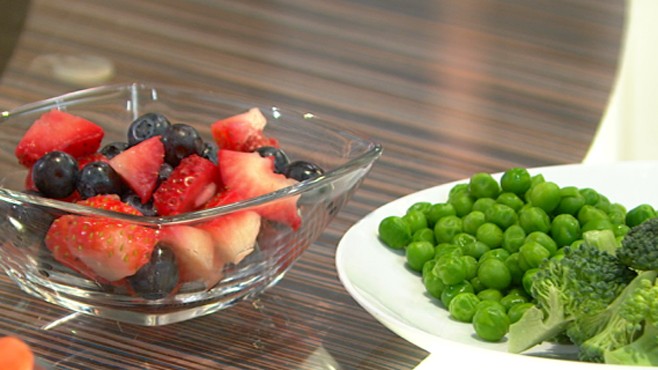|
Heart Disease Death Rate Drops With Each Added Fruit and Veggie Serving
By COURTNEY HUTCHISON, ABC News Medical Unit, Jan. 19, 2011

Watch the video above
It's time to make friends with the produce aisle: pumping your diet with fruits and vegetables isn't just
good for your waistline -- it
could save your life, according to new research from the University of Oxford.
While "5 a day" has traditionally been the mantra for fruit and veggie consumption, researchers found that those who
consumed eight or more servings were 22 percent less likely to
die from heart disease than those who consumed three or fewer servings a day.
Even among those who couldn't manage the eight servings,
more fruits and veggies
consistently meant a lower risk; for every additional serving above two per day, researchers observed a four percent
decrease in the rate of heart disease deaths.
Though past studies have linked the consumption of fruit and vegetables to heart health, many remain skeptical as to
whether these foods have a direct protective effect on the heart. Given the size of Tuesday's study (over 300,000
participants from eight different European countries) and the strength of its findings, some doctors feel that it may
erase and remaining doubts concerning fruits and veggies, and cardiovascular health.
"This is probably the largest study of its type and should convince even the greatest skeptic of the value of fruits
and veggies," said Dr. Randall Zusman, director of the division of hypertension at Massachusetts General Hospital.
"This compares 'enough' fruit
and vegetable intake to 'more than enough' and suggests that 'more than enough' is better," said Dr. David Katz,
director of Yale University's Prevention Research Center. This could have big implications considering that the U.S.
population "doesn't even approximate the 'enough' target" as it is.
The study, which was published Tuesday in the European Heart Journal, is part of the EPIC trial, a long-term study in
Europe initially set up to track the effect of vegetable and fruit intake on cancer.
In the U.S., the recommended consumption of fruits and vegetables has often been promoted as "five a day". The Centers for Disease
Control and Prevention moved away from that recommendation in 2007, to a more flexible approach, dubbed Fruits & Veggies
- More Matters.
Instead of a flat recommendation of five servings a day, the new program changes recommendations based on age, sex
and activity level. For a 40-year-old sedentary man, recommendations are now two cups of fruits and three cups of
vegetables a day; for a sedentary woman of that age, the recommendation is 1.5 cups of fruit and 2.5 cups of veggies.
From 5 a Day to "the More the Better"
So what exactly would the eight portions a day observed in the study look like?
A day of eight servings amounts to about 23 ounces. Eating nearly a pound and a half of produce may sound daunting,
but put it into real terms and it becomes more manageable:
"A large navel orange can easily weight close to 8 ounces and so does a large apple," says Carla Wolper with the
Obesity Research Center at St. Lukes-Roosevelt Hospital in New York. "That leaves a measly six ounces for salad, string
beans, or other vegetables on the dinner plate, so yes people can easily eat this much," she said.
Considering that the majority of the general population in the U.K. and the U.S. consume fewer than five recommended
servings of fruits and vegetables per day, asking for eight may be a bit of a stretch, concedes Dr. Francesca Crowe,
lead author on the study.
Given that each additional serving suggested an additional heart health benefit, "it may be a relatively simple
public health goal to encourage everyone to increase their intake of [fruits and vegetables] by a portion per day," she
says.
What Are Fruits and Vegetables Doing?
We all know that fruits and veggies are good for us, but why would eating them prevent death from heart disease?
The evidence points to a number of ways that these foods could work to boost heart health.
It could be that vegetables and fruits contain vitamins, minerals, and antioxidants that are having a specific effect
on cardiovascular health, says Dr. Keith Ayoob, associate professor in the department of pediatrics at the Albert
Einstein College of Medicine in New York City.
Another possible mechanism "is the impact of fruit and vegetables to lower inflammation, a known mechanism
contributing to cardiovascular disease," adds Dr. Stephen Devries, a preventive cardiologist at Northwestern Hospital.
No Harm in Piling on the Fruits and Veggies
It also may not be what fruits and veggies add to the diet, but what they replace. There's less room in the diet for
the high-fat, high-cholesterol, high-salt foods often associated with increased risk of heart disease when someone is
consuming so many fruits and vegetables each day, doctors noted.
This makes for "lower blood pressure (because these foods are salt free), lower cholesterol (because they are fat
free), lower weight (because they are likely to be associated with weight loss), [and] lower blood sugar (lower
carbohydrate and sugar content)," says Zusman.
"Just by taking up a lot of room" in the stomach, [those] ounces of fruits and vegetables inherent in eight servings
"will have a salutary effect vis-a-vis [cardiovascular disease]," Wolper says.
More importantly, there are few if any drawbacks to consuming a good amount of fruits and veggies .
"I tell my patients to eat whatever fruits and veggies they like at whatever means they can," says Ayoob. "They're
that good for you. Indeed Weight Watchers doesn't even count them in their programs now. No one gains weight eating
whole fruits and veggies."
Almost all of us need some way to bridge between what we actually
eat and what we need to eat for good health, and to lower our risk of disease and pre-mature death.
For us Juice Plus+ is that bridge. What's yours? At about $10 a week per adult, it's terrific value; and each adult can sponsor a child (between
4 yrs. and full-time college age) to get their Juice Plus+ free!
Please watch the video below to fully understand this concept. Let us know if you are ready to get started, or want another family member to also benefit from Juice Plus+.

|